NLIS 1
April 8, 2005
(Government Services)
The following is being distributed
at the request of the Petroleum Pricing Office:
Petroleum Pricing
Office makes early adjustment to furnace oil
Effective 12:01 a.m. Friday, April 8,
the Public Utilities Board�s Petroleum Pricing Office (PPO) will
increase the maximum price of No. 2 blend furnace oil by 2.37 cents
per litre (cpl), except in areas where a price freeze is in effect.
This change is the result of escalating prices for this and other
refined products on the New York Mercantile Exchange (NYMEX)
commodities market. Apart from furnace oil, the criteria for the
PPO�s interruption formula (see Backgrounder) were not realized for
any of the other products regulated in Newfoundland and Labrador.
The timeframe for the interruption formula has passed; therefore, no
further price changes will occur until the next regularly-scheduled
adjustment on April 15.
David Toms, PPO director (acting), said the commodities market has
shown highly aggressive pricing behaviour for all fuels regulated by
the PPO. Though the price of crude oil is not used to establish
maximum fuel prices in this province, its market movement plays a
significant role in fuel product prices on the commodities exchange.
Crude oil reached another record of more than $58 US this past week
and has remained above $50 US since February 22.
Among the numerous factors affecting the market has been concern
about insufficient fuel supply availability, despite increasing
inventories, to keep up with the projected demand even with OPEC�s
(Organization of Petroleum Exporting Countries) assurance that it
would make an additional boost to production quotas if current
prices are sustained.
The market also reacted swiftly with a pricing surge following
recent statements by Goldman Sachs investors that suggested the
global economy may have entered the early stages of a "super spike"
period, in which oil prices, as suggested by their analyses, could
eventually reach as much as $105 US. However, not all analysts agree
with this position.
As well, refinery production problems have factored into recent high
prices. A major refinery in Venezuela (the world�s fifth-biggest oil
exporter and a top supplier of crude and oil products to the U.S.)
was shut down for nearly a week by a power outage on March 31. Also,
a fatal explosion at a refinery in Texas, the third largest refinery
in the U.S., created heightened anxiety on the market about
production capacity.
Additionally, the U.S. Energy Information Administration (EIA)
report from March 30 showed another decline in distillate supplies,
which includes furnace oil, and these levels are already on the
lower end of the average range. Therefore, in the long term,
concerns remain about future ability to meet consumption demands.
"It isn�t known how long this market-pricing behaviour will continue
before prices start to recede, as many factors also exist that fail
to explain why prices are so high today," said Mr. Toms.
"Inventories for oil and products, such as gasoline, are currently
in a good position versus historic levels, but it�s the ability to
meet the future demand that has created anxiety in the market. It�s
important to note that the situation can change quickly based on a
turnaround in geopolitical events and expectations."
BACKGROUNDER
PPO benchmarks are established based on the average prices of
refined products in the
period since the last time maximum prices were established. The PPO
regularly sets maximum fuel prices on the 15th of each month.
For the interruption formula to be used on gasoline and distillate
fuels, the PPO requires the average of market prices to be 3.5 cpl
greater or less than the current PPO benchmark prices (except
propane, which requires +/- 5.0 cpl) over five market business days.
The formula is not used for five market days after new prices are
set under regulation, or if it interferes with the impending price
change made each month.
Illustrated in the following graphs is the market-price performance
of furnace oil and other fuels regulated by the PPO for recent
pricing periods up to April 4, 2005:
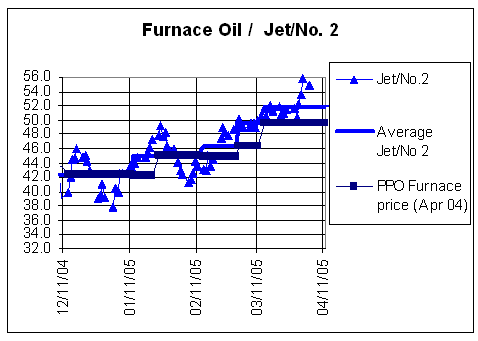
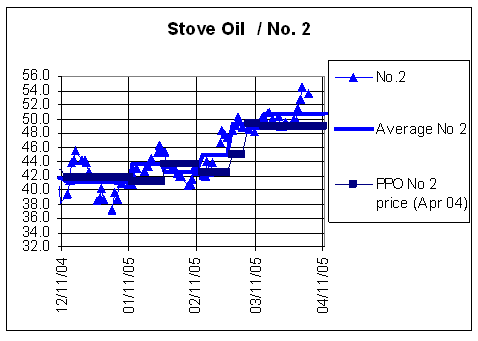
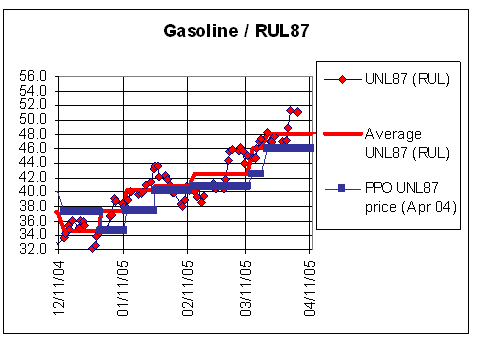
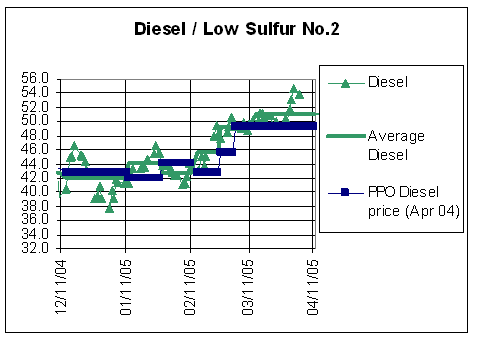
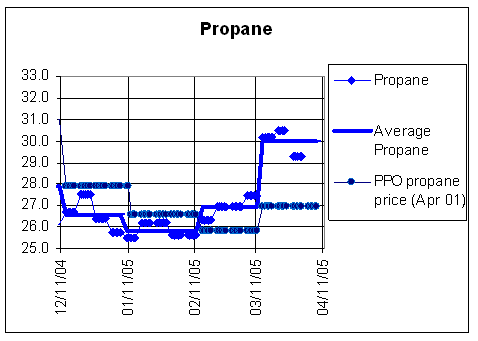
Media contact: Michelle Hicks,
Communications. Tel: 1-866-489-8800 or (709) 489-8837
1. Heating Fuels - Maximum Tank Wagon (or
** Tank Farm) Prices - April 08, 2005.
2005 04 08
11:35 a.m. |









